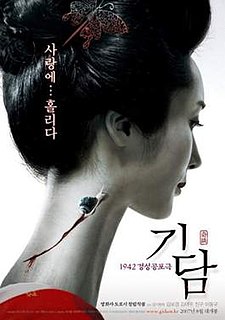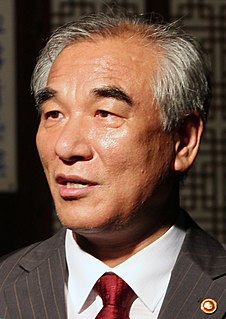
Epitaph is a 2007 South Korean film directed by brothers Jung Sik and Jung Bum-shik. The film is a horror film set primarily in 1942, while Korea was under the colonial rule of Japan. It is framed by scenes set in 1979.
Joo, also spelled Ju or Chu, is a Korean family name and an element in Korean given names. Its meaning differs based on the hanja used to write it.
Young-sik, also spelled Young-shik or Yong-sik, is a Korean masculine given name. Its meaning differs based on the hanja used to write each syllable of the name. There are 34 hanja with the reading "young" and 16 hanja with the reading "sik" on the South Korean government's official list of hanja which may be registered for use in given names. According to South Korean government data, Young-sik was the sixth-most popular name for baby boys in 1940, falling to seventh place in 1950.
Kwang-hyun, also spelled Gwang-hyun, is a Korean masculine given name. Its meaning differs based on the hanja used to write each syllable of the name. There are 13 hanja with the reading "kwang" and 35 hanja with the reading "hyun" on the South Korean government's official list of hanja which may be registered for use in given names.
Hyun-sik is a Korean unisex given name. Its meaning depends on the hanja used to write each syllable of the name. There are 35 hanja with the reading "hyun" and 16 hanja with the reading "sik" on the South Korean government's official list of hanja which may be registered for use in given names.
Yi-soo, also spelled Yi-su or Lee-soo, is a Korean unisex given name. Its meaning depends on the hanja used to write each syllable of the name. There are 35 hanja with the reading "yi" and 67 hanja with the reading "soo" on the South Korean government's official list of hanja which may be used in given names.
Kwang-su, also spelled Kwang-soo or Gwang-su, is a Korean masculine given name. Its meaning differs based on the hanja used to write each syllable of the name.
Kwang-ho is a Korean masculine given name. The meaning differs based on the hanja used to write each syllable of the name. There are 13 hanja with the reading "kwang" and 49 hanja with the reading "ho" on the South Korean government's official list of hanja which may be used in given names.
Kwang-seon, also spelled Kwang-sun, is a Korean masculine given name. The meaning differs based on the hanja used to write each syllable of the name. There are 13 hanja with the reading "kwang" and 41 hanja with the reading "seon" on the South Korean government's official list of hanja which may be used in given names.
Kwang-min is a Korean masculine given name. The meaning differs based on the hanja used to write each syllable of the name. There are 13 hanja with the reading "kwang" and 27 hanja with the reading "min" on the South Korean government's official list of hanja which may be used in given names.
Kwang-hyok, also spelled Gwang-hyeok, is a Korean masculine given name. Its meaning differs based on the hanja used to write each syllable of the name. There are 13 hanja with the reading "kwang" and nine hanja with the reading "hyok" on the South Korean government's official list of hanja which may be registered for use in given names.
Kwang-hee is a Korean unisex given name. The meaning depends on the hanja used to write each syllable of the name. There are 13 hanja with the reading "kwang" and 24 hanja with the reading "hee" on the South Korean government's official list of hanja which may be used in given names.
Kwang-seok, also spelled Kwang-suk or Gwang-seok, is a Korean masculine given name. The meaning differs based on the hanja used to write each syllable of the name. There are 13 hanja with the reading "kwang" and 20 hanja with the reading "seok" on the South Korean government's official list of hanja which may be used in given names.
Min is an uncommon Korean family name as well as a common syllable in Korean given names.
Jung-sik, also spelled Jeong-sik, is a Korean masculine given name. Its meaning differs based on the hanja used to write each syllable of the name. There are 65 hanja with the reading "jung" and 16 hanja with the reading "sik" on the South Korean government's official list of hanja which may be registered for use in given names.
In-sik, also spelled In-shik, is a Korean masculine given name. Its meaning differs based on the hanja used to write each syllable of the name. There are 29 hanja with the reading "in" and 16 hanja with the reading "sik" on the South Korean government's official list of hanja which may be registered for use in given names.
Moon-sik, also spelled Moon-shik, Mun-sik, or Mun-shik, is a Korean masculine given name. Its meaning differs based on the hanja used to write each syllable of the name. There are 14 hanja with the reading "moon" and 16 hanja with the reading "sik" on the South Korean government's official list of hanja which may be registered for use in given names.
Man-sik, also spelled Man-shik, is a Korean masculine given name. Its meaning differs based on the hanja used to write each syllable of the name. There are 19 hanja with the reading "man" and 16 hanja with the reading "sik" on the South Korean government's official list of hanja which may be registered for use in given names.
Won-sik, also spelled Won-shik, is a Korean masculine given name. Its meaning differs based on the hanja used to write each syllable of the name. There are 35 hanja with the reading "won" and 16 hanja with the reading "sik" on the South Korean government's official list of hanja which may be registered for use in given names.


